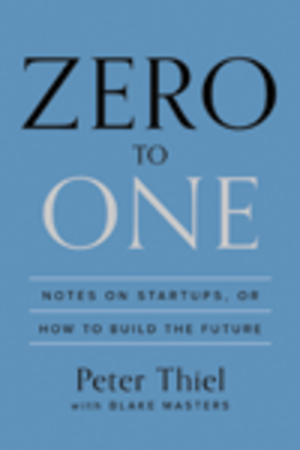Zero to One: Notes on Start-ups, or How to Build the Future by Peter Thiel
Book review: Zero to One - Notes on Start-ups, or How to Build the FutureThe guide to setting up on your own from the founder of PayPal is a cut above the usual memoir, says Matthew Partridge.

Get the latest financial news, insights and expert analysis from our award-winning MoneyWeek team, to help you understand what really matters when it comes to your finances.
You are now subscribed
Your newsletter sign-up was successful
Want to add more newsletters?

Zero to One: Notes on Start-ups, or How to Build the Future
By Peter Thiel (with Blake Masters)Published by Crown Business (£16.99)(Buy at Amazon)
If you pick up a book by any well-known entrepreneur, it's a pretty good bet that it'll follow a set pattern. Firstly, it will contain a lot of boasting about their career. Secondly, it will contain a lot of reheated business clichs.
Try 6 free issues of MoneyWeek today
Get unparalleled financial insight, analysis and expert opinion you can profit from.

Sign up to Money Morning
Don't miss the latest investment and personal finances news, market analysis, plus money-saving tips with our free twice-daily newsletter
Don't miss the latest investment and personal finances news, market analysis, plus money-saving tips with our free twice-daily newsletter
However, Peter Thiel, famous for co-founding PayPal and investing early in Facebook, has written a book that aims to be different. Zero to One: Notes on Start-ups is based around an entrepreneurship class that he taught at Stanford University.
The main argument of the book isthat most successful entrepreneurship comes from creating a radically new product or market, rather thancopying an existing concept or even incrementally improving on it.
Approaches relying on copying or improving (what Thiel refers to as "horizontal innovation") inevitably lead to a high degree of competition, driving down margins and slashing the chances of success.
In contrast, firms that "vertically innovate" can gain monopoly control of a market, allowing them to reap huge rewards. However, since mimicry is much easier, many tech entrepreneurs still go down that route.
The ubiquity of me-too strategies has important implications for society. Thiel's big worry is that America has mostly lost its taste for sweeping innovation and grand projects.
However, he's not a complete pessimist, since he believes that artificial intelligence will eventually allow us to reach the "singularity", a tipping point beyond which we'll be able to re-engineer ourselves into superhumans.
Thiel also offers some other interesting insights. While he thinks that salespeople make disastrous leaders of technology firms, he cautions start-ups against the view that "if the technology is good enough, it will sell itself". The trick is to work out what type of sales strategy suits the product and then aggressively pursue it.
Similarly, while most venture-capital firms make a large number of small investments, the really successful ones make a much smaller number but aggressively back them.
There's plenty to disagree with too. While too much competition may be bad for individuals, there's strong evidence that countries with high levels of competition do tend to be the most innovative. And some of Thiel's later digressions, which include musings about Elvis and Michael Jackson, could easily have been removed.
It would also have been interesting to hear more about setting up PayPal. Nonetheless, the book is definitely a cut above the usual memoir.
Zero to One: Notes on Start-ups, or How to Build the Future, by Peter Thiel (with Blake Masters). Published by Crown Business, £16.99.
//
// ]]>
Get the latest financial news, insights and expert analysis from our award-winning MoneyWeek team, to help you understand what really matters when it comes to your finances.

-
 Has the market misjudged Relx?
Has the market misjudged Relx?Relx shares fell on fears that AI was about to eat its lunch, but the firm remains well placed to thrive
-
 Dario Amodei: The AI boss in a showdown with Trump
Dario Amodei: The AI boss in a showdown with TrumpAnthropic’s CEO Dario Amodei was on an extraordinary upward trajectory when he found himself on the wrong side of the American president. He is about to be severely tested.